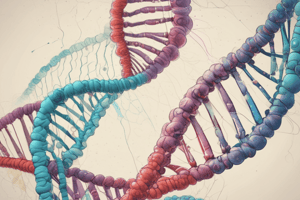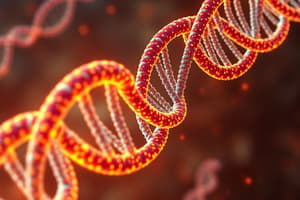Podcast
Questions and Answers
What is a mutation?
What is a mutation?
- A change in the RNA sequence of an organism
- A change in the cell division process of an organism
- A change in the DNA sequence of an organism (correct)
- A change in the protein sequence of an organism
How can mutations occur?
How can mutations occur?
- From exposure to sunlight
- From drinking water
- During cell division (correct)
- Through breathing air
What can happen if there is a mistake in transcription of genetic information?
What can happen if there is a mistake in transcription of genetic information?
- Changes in the number of chromosomes
- Changes in the process of photosynthesis
- Changes in the sequence of nitrogenous bases (correct)
- Changes in the process of digestion
How do mutations affect cellular properties and behavior?
How do mutations affect cellular properties and behavior?
Where can mutations occur in an organism?
Where can mutations occur in an organism?
How do mutations pass on to offspring?
How do mutations pass on to offspring?
What is the main difference between gene mutation and chromosomal mutation?
What is the main difference between gene mutation and chromosomal mutation?
How can a mutation in a body cell differ from a mutation in a sex cell?
How can a mutation in a body cell differ from a mutation in a sex cell?
What is a common outcome of a frameshift mutation caused by an insertion of a base?
What is a common outcome of a frameshift mutation caused by an insertion of a base?
Why are most mutations considered harmful?
Why are most mutations considered harmful?
What role do inherited gene mutations play in diseases?
What role do inherited gene mutations play in diseases?
How can a deletion of a base in a DNA sequence impact protein structure?
How can a deletion of a base in a DNA sequence impact protein structure?
Flashcards are hidden until you start studying
Study Notes
Mutations
- A mutation is a change in the DNA sequence of an organism.
- Mutations can occur due to errors in DNA replication, exposure to mutagens, or viral infections.
Causes of Mutations
- Mutagens, such as toxic chemicals and harmful radiation, can induce mutations.
- Mistakes in DNA replication, mitosis, and meiosis can also cause mutations.
Effects of Mutations
- Changes in the DNA sequence can lead to changes in protein structure or level of expression, affecting cellular properties and behavior.
- Changes in genes can occur in reproductive cells and body cells, but only mutations in sex cells pass on to offspring.
Types of Mutations
- Gene mutations: permanent changes in the DNA sequence of a gene.
- Chromosomal mutations: changes at the chromosome level, resulting in gene deletion, duplication, or rearrangement.
Consequences of Mutations
- Most mutations are harmful and can cause cancer or birth defects.
- Some mutations can be beneficial to the species, such as a mutation in blood proteins that prevents viruses or parasites from thriving.
- Mutations can also cause severe diseases, such as sickle-cell anemia, which is caused by a recessive gene.
Frameshift Mutations
- Deletion or insertion of a base can change the reading frame of the codon, leading to a frameshift mutation.
- This can result in a different amino acid sequence and a corresponding change in protein structure and function.
Studying That Suits You
Use AI to generate personalized quizzes and flashcards to suit your learning preferences.




